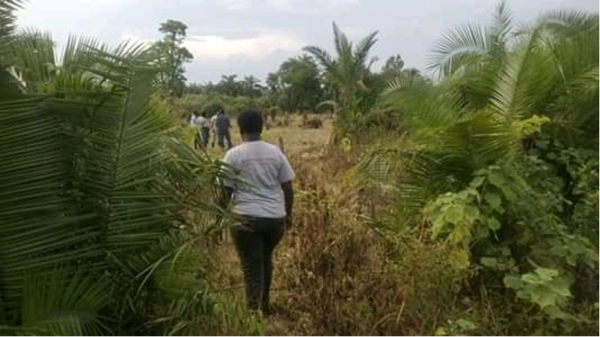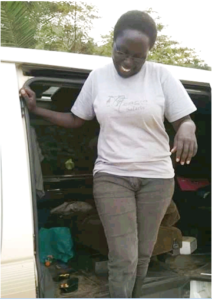‘Tokabiila maata gayiise’ is a Luganda saying that loosely translates to ‘do not cry over spilt milk’, and encourages people to cut their losses and move on. Salmah Dusman, is one of the businesswomen affected by the COVID – 19 national lockdown in Uganda. Her story is one of resilience and focuses on productivity while forging ahead rather than lamenting over losses.
Salmah’s main source of income is farming which she does with her family at a farm in Kalule, Luweero district about 50Kms from Kampala. Before the pandemic, she planted seven acres of banana and three acres of sweet potatoes, beans and vegetables. The outbreak of the Covid-19 pandemic and lockdowns saw her dedicate even more time to her farm than previously.

Salmah assessing the untended part of the land
She admits things were working out fine until government banned the use of public transport which forced her to finding other means to collect food in order to continue to supply produce from the farm to the trading centers and individual households that place orders. Salmah started to experience challenges when her clients began to delay payment for deliveries.
“The delays made it difficult for me to travel to the farm frequently. As a result, a lot of food would get ripe and go bad before taking them to markets. This forced me to sell the farm produce at a very low price”
Many farmers in Uganda continue to struggle from the effects of produce price falls especially bananas or matoke, which is one of the staple foods in Uganda. At one point a bunch sold for less than $1 while it used to retail at $ 7 – 10 before the crisis.
Even though farmers continue to experience price drops from time to time, the price slash on fresh foods that occurred this year during the pandemic has been even more unprecedented. Salmah realized that more than a quarter of the crops planted at the farm were stolen but the farm attendants could not explain what happened. They had also not been tending to the farm. “We also used to send payments to the attendants but no work was done. They went into recess too” Salmah elaborated.

Courtesy Photo: Salmah arriving at the farm after the lockdown was lifted in Uganda.
To add on to this mishap, Salmah was deceived by people pretending to be sub-suppliers promising to bring her beans and maize. To demonstrate her commitment, they suggested that she covers the fuel cost. She agreed and gave the money in advance because they were introduced by a gentleman she knew very well. To date, they have never returned or supplied the consignment. The person who introduced them to her cannot be reached and seems to have switched off his phone.
While she may be struggling to recover from the losses, Salmah has set all that behind her, aiming at even bigger plan such as planting more crops and being more hands-on at the farm.
‘The crisis helped expose the untrustworthy nature of some of my workers… I am also researching for value added possibilities such as better preservation methods and I believe I can store my farm produce without them going to waste, I would store in bulk instead of cutting prices and giving them out on credit.”
Read more about Covid-19 Impact stories from Nigeria.










 The Trust supports and mobilises civil society networks on issues of ending child marriage, ending violence against children, ending female genital mutilation and promoting children’s rights, to carry out advocacy and action across Africa. Special focus is placed on Malawi, Mozambique, Tanzania and Zambia where child marriage continues to be a problem largely driven by poverty, gender inequality, harmful traditional practices, conflict, low levels of literacy, limited opportunities for girls and weak or non-existent protective and preventive legal frameworks.
The Trust supports and mobilises civil society networks on issues of ending child marriage, ending violence against children, ending female genital mutilation and promoting children’s rights, to carry out advocacy and action across Africa. Special focus is placed on Malawi, Mozambique, Tanzania and Zambia where child marriage continues to be a problem largely driven by poverty, gender inequality, harmful traditional practices, conflict, low levels of literacy, limited opportunities for girls and weak or non-existent protective and preventive legal frameworks.




 Education is a fundamental right for all children, which is also a vehicle for social, economic and political transformation in communities, countries and the African continent at large. Recent studies indicate a lack of progress in some of the critical commitments aimed at improving education quality, access, retention and achievement, particularly for girls. In most African countries, girls may face barriers to learning, especially when they reach post-primary levels of education. By implementing multi-dimensional approaches to education which includes core education, personal development, life skills and economic competencies, the Trust partners with funding partners, governments, civil societies and the private sector to improve education access.
Education is a fundamental right for all children, which is also a vehicle for social, economic and political transformation in communities, countries and the African continent at large. Recent studies indicate a lack of progress in some of the critical commitments aimed at improving education quality, access, retention and achievement, particularly for girls. In most African countries, girls may face barriers to learning, especially when they reach post-primary levels of education. By implementing multi-dimensional approaches to education which includes core education, personal development, life skills and economic competencies, the Trust partners with funding partners, governments, civil societies and the private sector to improve education access.

 The Nutrition and Reproductive, Maternal, New-born, Child and Adolescent Health and Nutrition, (RMNCAH+N) of the Children’s Rights and Development Programme aims at promoting the Global Strategy for women, children and adolescents’ health within the Sustainable Development Goals (SDG) agenda. The strategy emphasises on the importance of effective country leadership as a common factor across countries making progress in improving the health of women, children and adolescents.
The Nutrition and Reproductive, Maternal, New-born, Child and Adolescent Health and Nutrition, (RMNCAH+N) of the Children’s Rights and Development Programme aims at promoting the Global Strategy for women, children and adolescents’ health within the Sustainable Development Goals (SDG) agenda. The strategy emphasises on the importance of effective country leadership as a common factor across countries making progress in improving the health of women, children and adolescents. Through its Early Childhood Development (ECD) plan, The Trust will seek to put into action the new science and evidence Report that was presented by Lancet Series on Good and early development – the right of every child. This will be achieved by mobilising like-minded partners to contribute in the new science and evidence to reach all young children with ECD. The Trust’s goal is to be a catalyst for doing things differently, in particular, to rid fragmentation and lack of coordination across ECD sectors. In response to evidence showing the importance of political will in turning the tide against the current poor access and quality of ECD. Even before conception, starting with a mother’s health and social economic conditions, the early years of a child’s life form a fundamental foundation that determines whether a child will survive and thrive optimally.
Through its Early Childhood Development (ECD) plan, The Trust will seek to put into action the new science and evidence Report that was presented by Lancet Series on Good and early development – the right of every child. This will be achieved by mobilising like-minded partners to contribute in the new science and evidence to reach all young children with ECD. The Trust’s goal is to be a catalyst for doing things differently, in particular, to rid fragmentation and lack of coordination across ECD sectors. In response to evidence showing the importance of political will in turning the tide against the current poor access and quality of ECD. Even before conception, starting with a mother’s health and social economic conditions, the early years of a child’s life form a fundamental foundation that determines whether a child will survive and thrive optimally.